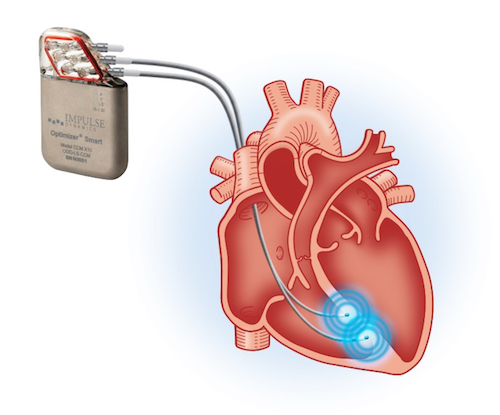UH First in Northeast Ohio to Treat Patient with Heart Failure Using Cardiac Contractility Modulation
June 22, 2021

CLEVELAND – A University Hospitals (UH) patient is the first in Northeast Ohio to undergo a new, innovative procedure called CCM® therapy. Physicians at UH Harrington Heart & Vascular Institute are among the first in the United States and the only in Northeast Ohio to use CCM therapy, delivered by the Optimizer® system, to treat patients suffering from heart failure.
Heart failure, a progressive condition in which the heart slowly weakens and is not able to adequately supply oxygen-rich blood, can severely limit a patient’s quality of life. Cardiac contractility modulation (CCM therapy) is a new, FDA-approved heart failure treatment proven to improve quality of life for patients that are no longer adequately responding to medications to manage symptoms or slow the progression of heart failure.1 The innovative therapy is the first of its kind intended to improve the contraction of the heart, allowing more oxygen-rich blood to reach the body.1 CCM therapy works by delivering precisely timed electrical pulses to the heart and can be used in conjunction with medications and other heart failure therapies.
In May of 2021, Ivan Cakulev, MD, Medical Director, Ambulatory Cardiac Telemetry at UH Cleveland Medical Center, performed the first CCM therapy device procedure in Northeast Ohio.
“CCM therapy is a breakthrough therapy option for heart failure patients that is intended to help them feel better, so they can once again do the things they love,” said Dr. Cakulev. “Our team at University Hospitals is passionate about bringing hope to patients who are suffering and CCM therapy is another way to provide relief and improve symptoms for heart failure patients.”
Heart failure affects an estimated 6.5 million Americans and nearly 26 million people worldwide.2 These patients experience debilitating symptoms, including breathlessness, fatigue, confusion and swelling in the legs that make everyday activities challenging and significantly diminish quality of life. Today, most heart failure patients are prescribed medications intended to slow the progression of the disease and manage symptoms. As the condition progresses, these treatments lose their effectiveness and the quality of life for heart failure patients will continue to decline.
“UH is at the forefront of innovation and this is just another example of that,” said Mehdi Shishehbor, DO, MPH, PhD, President, UH Harrington Heart & Vascular Institute; Angela and James Hambrick Master Clinician in Innovation; and Professor at the Case Western Reserve School of Medicine. “When we discover and evaluate new technology, we open doors to more treatment options for our patients, which we hope will lead to better care and optimal outcomes.”
CCM therapy may be an appropriate option for up to 70 percent of NYHA Class III (a classification of heart symptoms) heart failure patients who continue to experience symptoms despite taking the optimal heart failure medications for their condition.1
CCM therapy was developed by Impulse Dynamics, based in Marlton, NJ.
To find out if CCM therapy is right for you or someone you love, please call UH Harrington Heart & Vascular Institute at 216-844-3800.
References
1 Abraham WT, Kuck KH, Goldsmith RL, et al. A randomized controlled trial to evaluate the safety and efficacy of cardiac contractility modulation. JACC Heart Failure. 6(10), 874-883 (2018).
2 Savarese G, Lund LH. Global Public Health Burden of Heart Failure. Card Fail Rev. 2017 Apr; 3(1): 7–11.


